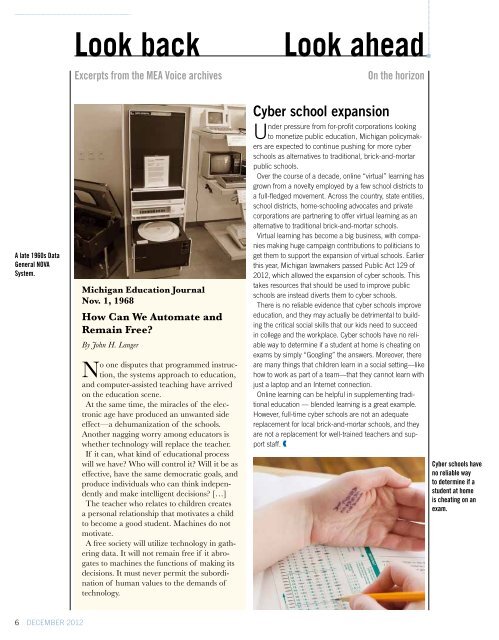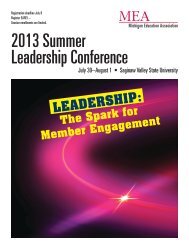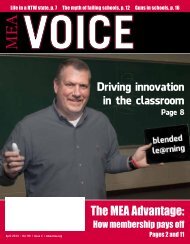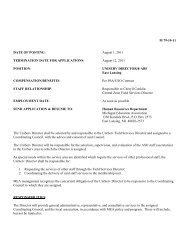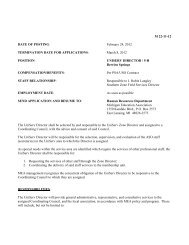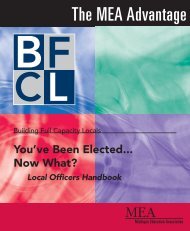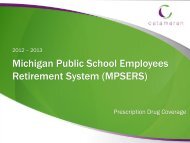2012 December - Michigan Education Association
2012 December - Michigan Education Association
2012 December - Michigan Education Association
You also want an ePaper? Increase the reach of your titles
YUMPU automatically turns print PDFs into web optimized ePapers that Google loves.
A late 1960s Data<br />
General NOVA<br />
System.<br />
6 DECEMBER <strong>2012</strong><br />
Look back<br />
Excerpts from the MEA Voice archives<br />
<strong>Michigan</strong> <strong>Education</strong> Journal<br />
Nov. 1, 1968<br />
How Can We Automate and<br />
Remain Free?<br />
By John H. Langer<br />
No one disputes that programmed instruction,<br />
the systems approach to education,<br />
and computer-assisted teaching have arrived<br />
on the education scene.<br />
At the same time, the miracles of the electronic<br />
age have produced an unwanted side<br />
effect—a dehumanization of the schools.<br />
Another nagging worry among educators is<br />
whether technology will replace the teacher.<br />
If it can, what kind of educational process<br />
will we have? Who will control it? Will it be as<br />
effective, have the same democratic goals, and<br />
produce individuals who can think independently<br />
and make intelligent decisions? […]<br />
The teacher who relates to children creates<br />
a personal relationship that motivates a child<br />
to become a good student. Machines do not<br />
motivate.<br />
A free society will utilize technology in gathering<br />
data. It will not remain free if it abrogates<br />
to machines the functions of making its<br />
decisions. It must never permit the subordination<br />
of human values to the demands of<br />
technology.<br />
Look ahead<br />
Cyber school expansion<br />
On the horizon<br />
Under pressure from for-profit corporations looking<br />
to monetize public education, <strong>Michigan</strong> policymakers<br />
are expected to continue pushing for more cyber<br />
schools as alternatives to traditional, brick-and-mortar<br />
public schools.<br />
Over the course of a decade, online “virtual” learning has<br />
grown from a novelty employed by a few school districts to<br />
a full-fledged movement. Across the country, state entities,<br />
school districts, home-schooling advocates and private<br />
corporations are partnering to offer virtual learning as an<br />
alternative to traditional brick-and-mortar schools.<br />
Virtual learning has become a big business, with companies<br />
making huge campaign contributions to politicians to<br />
get them to support the expansion of virtual schools. Earlier<br />
this year, <strong>Michigan</strong> lawmakers passed Public Act 129 of<br />
<strong>2012</strong>, which allowed the expansion of cyber schools. This<br />
takes resources that should be used to improve public<br />
schools are instead diverts them to cyber schools.<br />
There is no reliable evidence that cyber schools improve<br />
education, and they may actually be detrimental to building<br />
the critical social skills that our kids need to succeed<br />
in college and the workplace. Cyber schools have no reliable<br />
way to determine if a student at home is cheating on<br />
exams by simply “Googling” the answers. Moreover, there<br />
are many things that children learn in a social setting—like<br />
how to work as part of a team—that they cannot learn with<br />
just a laptop and an Internet connection.<br />
Online learning can be helpful in supplementing traditional<br />
education — blended learning is a great example.<br />
However, full-time cyber schools are not an adequate<br />
replacement for local brick-and-mortar schools, and they<br />
are not a replacement for well-trained teachers and support<br />
staff.<br />
Cyber schools have<br />
no reliable way<br />
to determine if a<br />
student at home<br />
is cheating on an<br />
exam.


